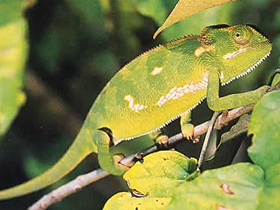No two members of the same species resemble each other exactly. They will be of different sizes, colors and temperaments. Because of this distinction, one of them can adapt better to its environment, live longer and reproduce more successfully. This advantage is known as natural selection.
The theory of evolution gives an added significance to the process of adaptation, claiming that under conditions that favor continual adaptation, creatures undergo a change in species over time.
But this evolutionist claim—that changes in conditions lead to an evolution of species—is false. A species can adapt to change in its environment only to the extent that its genetic potential allows. If that genetic potential does not allow for ready adaptation, then the species cannot adapt to changing conditions and does not survive. No species ever changes into a new one by adapting to new conditions; it always remains a member of the same species. (See Natural selection.)


